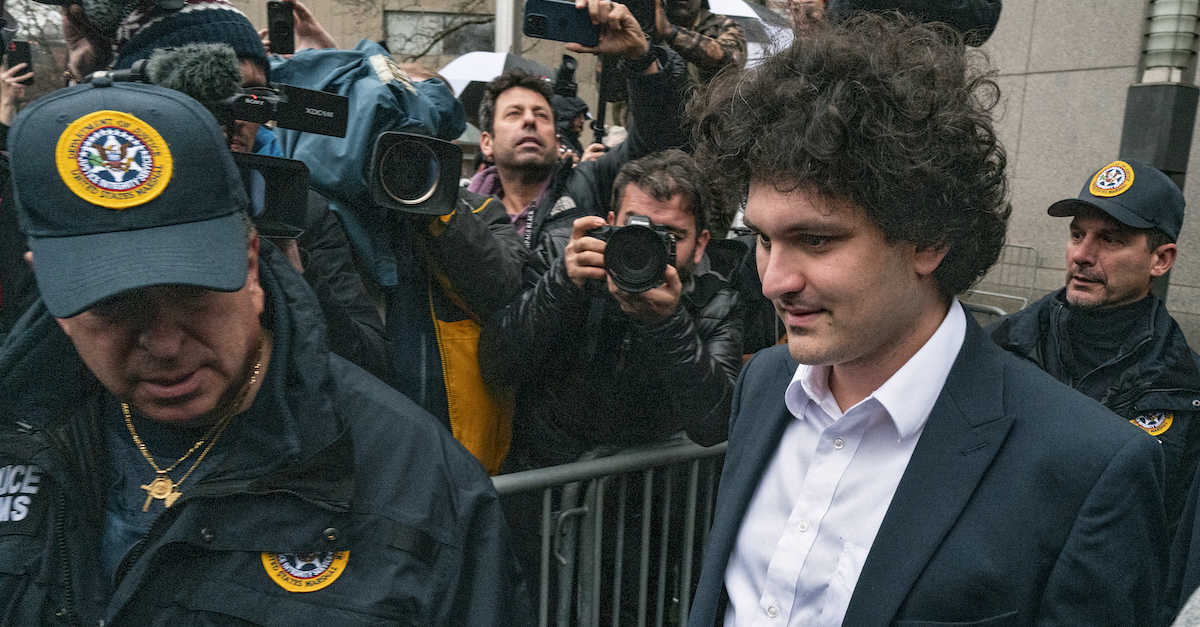
FTX founder Sam Bankman-Fried leaves Manhattan federal court, Tuesday, Jan. 3, 2023, in New York, after he pleaded not guilty to charges that he cheated investors and looted customer deposits on his cryptocurrency trading platform. (AP Photo/Craig Ruttle)
A federal judge pointedly asked why federal prosecutors haven’t asked to jail FTX founder Sam Bankman-Fried, after the government reported multiple possible violations of the terms of his release.
Senior U.S. District Judge Lewis Kaplan remarked that there may be “probable cause to believe” that Bankman-Fried may have committed a “federal felony” while on release on a $250 million pre-trial bond, namely attempted and actual “witness tampering.” He was referring to multiple instances of Bankman-Fried’s encrypted communications and web surfing while released to his parents’ home in California.
“Why am I being asked to turn him loose in this garden of electronic devices?” Kaplan asked.
The government argues that Bankman-Fried should be restricted from computers and internet in light of the suspected breaches.
“We now have before the court several instances of specific conduct that favor a modification of the bail terms,” Assistant U.S. Attorney Nicolas Roos said in court.
Bankman-Fried, widely known by his initials SBF, was previously hauled into court after prosecutors said that he sent an encrypted message to FTX’s current general counsel asking to “vet things” with each other. Prosecutors called it a possible attempt to influence a witness.
At a prior hearing on Feb. 9, Judge Kaplan appeared unsatisfied with the measures prosecutors and defense attorneys took to prevent other potential violations. The rejected agreement banned the use of encryption — with a notable exception for WhatsApp, the Facebook owned platform.
Kaplan noted that encryption long predated computers — and that Mary Queen of Scots created a code for communications that scholars only recently cracked. The analogy illustrated the judge’s underlying point.
“The fact that you’ve negotiated something that makes the government sort of comfortable and that makes you and your client comfortable doesn’t necessarily make me comfortable,” Kaplan said.
After ordering prosecutors and defense attorneys to find a sustainable solution, Bankman-Fried may have slipped up again. Prosecutors said that they discovered him repeatedly using a virtual private network, or VPN, to surf the internet. VPNs are a way of masking internet traffic or accessing certain websites in other countries. One of those uses of the VPN post-dated the previous hearing.
Bankman-Fried claimed that he only used the VPN to watch major football games: first, the NFC and AFC championships, then the Super Bowl, through a service in Bermuda. He lived in that Caribbean nation before being confined on bail to his parents’ house in California.
Despite notifying the court of the possible violations, prosecutors never asked to revoke Bankman-Fried’s bond. Kaplan did not raise the possibility at the hearing earlier this month. The first to invoke the specter of jail on the courtroom record was a private citizen, who wrote a letter urging the judge to send him behind bars.
“Please jail him,” S. Keithley from Texas wrote on Feb. 9. “Money does talk.”
That letter became public hours before Bankman-Fried’s hearing on Thursday, and Keithley appeared puzzled about how the embattled cryptocurrency honcho managed to avoid being behind bars.
“People are worried about this communications, whether he can encrypt, what method(s) of communication he is using — why not just revoke his bail and jail him,” Keithley asked.
Kaplan addressed that proposal in an exchange with the government.
“There is a solution, but it’s not one that anyone’s proposed here,” the judge said.
Prosecutors didn’t appear to entertain incarceration until prompted on Thursday, with debate focusing mostly on whether to severely restrict Bankman-Fried’s use of the internet and computers — or only his VPN use.
Defense attorney Mark Cohen characterized the non-jail proposal by the government “draconian” enough, arguing it would stand in the way of Bankman-Fried’s preparations for trial.
“He’s literally on trial for his life,” Cohen said. “We need him.”
Bankman-Fried has been out on bond and living in his parents’ California home ever since being charged late last year on an eight-count indictment alleging wire fraud, conspiracy and campaign finance violations. The Department of Justice and the Securities and Exchange Commission claim that the 30-year-old cryptocurrency mogul raised more than $1.8 billion from FTX investors, while allegedly diverting his customers’ money to Alameda Research LLC, his privately-held hedge fund.
Thursday’s hearing, like the last one, ended on an inconclusive note, with Kaplan ordering the parties to fashion an agreement to address his concerns.
Although it was the second bail hearing this month, Kaplan noted that it isn’t a “revocation hearing.”
“But it could get there, conceivably,” he added.